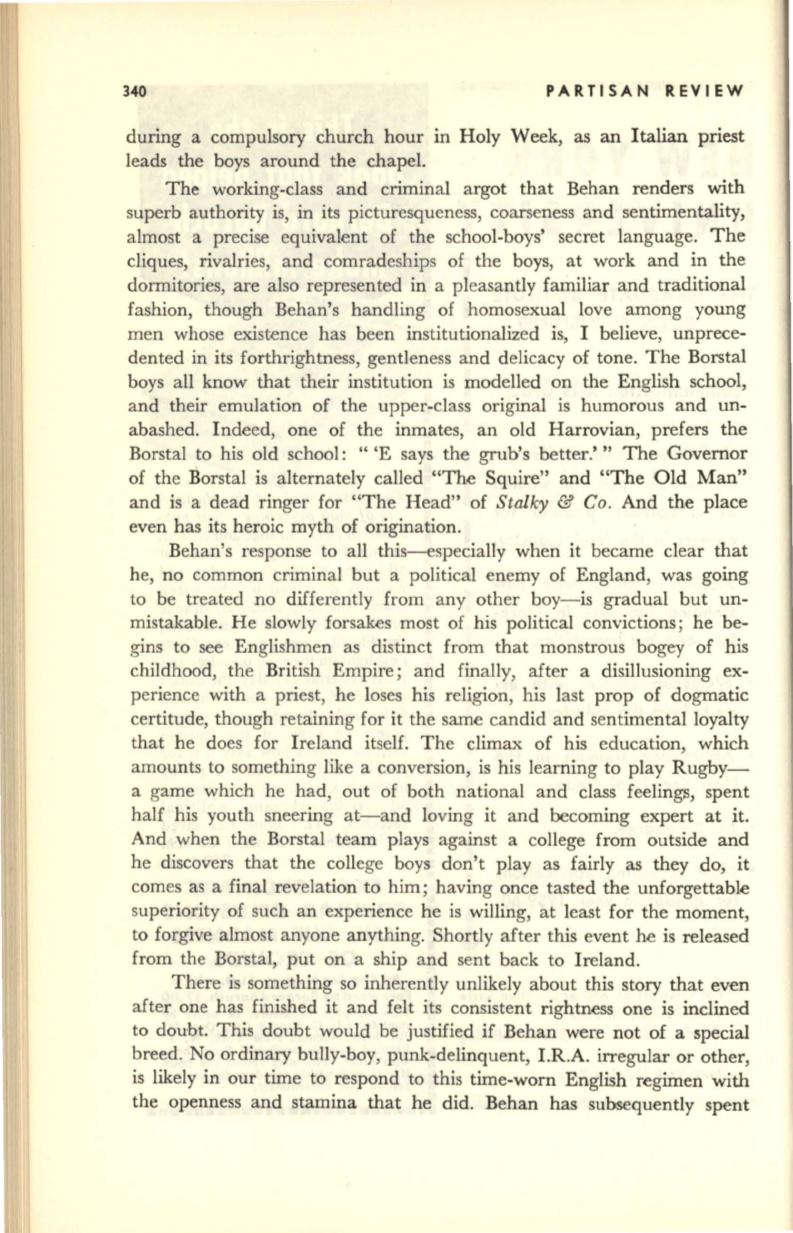
340
PARTISAN REVIEW
during a compulsory church hour in Holy Week, as an Italian priest
leads the boys around the chapel.
The working-class and criminal argot that Behan renders with
superb authority is, in its picturesqueness, coarseness and sentimentality,
almost a precise equivalent of the school-boys' secret language. The
cliques, rivalries, and comradeships of the boys, at work and in the
dormitories, are also represented in a pleasantly familiar and traditional
fashion, though Behan's handling of homosexual love among young
men whose existence has been institutionalized is, I believe, unprece–
dented in its forthrightness, gentleness and delicacy of tone. The Borstal
boys all know that their institution is modelled on the English school,
and their emulation of the upper-class original is humorous and un–
abashed. Indeed, one of the inmates, an old Harrovian, prefers the
Borstal to his old school: "'E says the grub's better.''' The Governor
of the Borstal is alternately called "The Squire" and "The Old Man"
and is a dead ringer for "The Head" of
Stalky
&
Co.
And the place
even has its heroic myth of origination.
Behan's response to all this-especially when it became clear that
he, no common criminal but a political enemy of England, was going
to be treated no differently from any other boy-is gradual but un–
mistakable. He slowly forsakes most of his political convictions; he be–
gins to see Englishmen as distinct from that monstrous bogey of his
childhood, the British Empire; and finally, after a disillusioning ex–
perience with a priest, he loses his religion, his last prop of dogmatic
certitude, though retaining for it the same candid and sentimental loyalty
that he does for Ireland itself. The climax of his education, which
amounts to something like a conversion, is his learning to play Rugby–
a game which he had, out of both national and class
feelin~,
spent
half his youth sneering at-and loving it and becoming expert at it.
And when the Borstal team plays against a college from outside and
he discovers that the college boys don't playas fairly as they do, it
comes as a final revelation to him; having once tasted the unforgettable
superiority of such an experience he is willing, at least for the moment,
to forgive almost anyone anything. Shortly after this event he is released
from the Borstal, put on a ship and sent back to Ireland.
There is something so inherently unlikely about this story that even
after one has finished it and felt its consistent rightness one is inclined
to doubt. This doubt would be justified if Behan were not of a special
breed. No ordinary bully-boy, punk-delinquent, I.R.A. irregular or other,
is likely in our time to respond to this time-worn English regimen with
the openness and stamina that he did. Behan has subsequently spent


